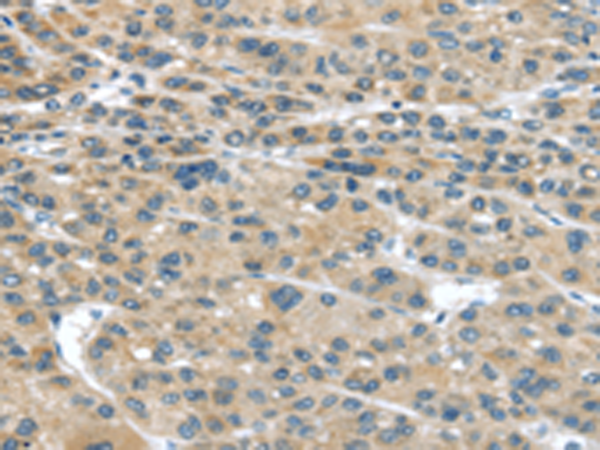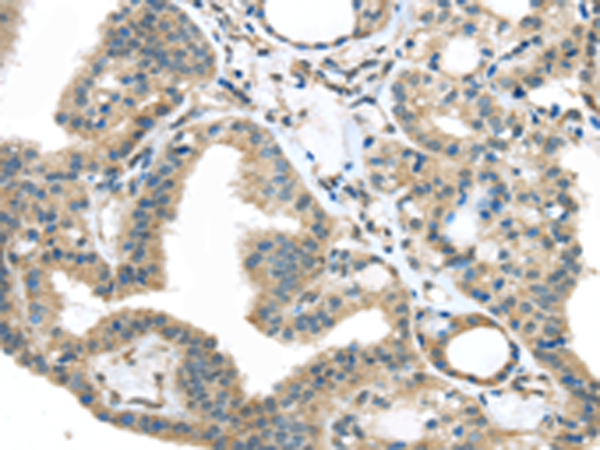

| WB | 1/500-1/1000 | Human,Mouse,Rat |
| IF | 咨询技术 | Human,Mouse,Rat |
| IHC | 1/50-1/100 | Human,Mouse,Rat |
| ICC | 技术咨询 | Human,Mouse,Rat |
| FCM | 咨询技术 | Human,Mouse,Rat |
| Elisa | 咨询技术 | Human,Mouse,Rat |
| Aliases | BP-4; IBP4; IGFBP-4; HT29-IGFBP |
| Host/Isotype | Rabbit IgG |
| Antibody Type | Primary antibody |
| Storage | Store at 4°C short term. Aliquot and store at -20°C long term. Avoid freeze/thaw cycles. |
| Species Reactivity | Human, Mouse, Rat |
| Immunogen | Fusion protein of human IGFBP4 |
| Formulation | Purified antibody in PBS with 0.05% sodium azide and 50% glycerol. |
+ +
以下是关于alpha平滑肌肌动蛋白(α-SMA)抗体的3篇代表性文献,包含名称、作者和摘要概括:
---
1. **文献名称**: *The myofibroblast in wound healing and fibrocontractive diseases*
**作者**: Gabbiani, G. (2003)
**摘要**: 该综述总结了α-SMA作为肌成纤维细胞标志物的关键作用,指出其抗体在识别纤维化组织(如肝硬化和瘢痕)中活化的肌成纤维细胞的应用,并探讨了其在组织收缩和疾病进展中的机制。
---
2. **文献名称**: *Alpha-smooth muscle actin expression upregulates fibroblast contractile activity*
**作者**: Hinz, B., et al. (2001)
**摘要**: 通过α-SMA抗体标记,研究发现α-SMA的表达直接增强成纤维细胞的收缩能力,实验利用免疫荧光和凝胶收缩实验证明其在伤口愈合和病理性纤维化中的功能重要性。
---
3. **文献名称**: *Cancer-associated fibroblasts as key players in cancer microenvironment*
**作者**: Kalluri, R., & Zeisberg, M. (2006)
**摘要**: 文章利用α-SMA抗体鉴定肿瘤相关成纤维细胞(CAFs),揭示其在肿瘤基质重塑、血管生成和转移中的作用,强调了该抗体在肿瘤微环境研究中的诊断价值。
---
**注**:如需更多文献或特定研究方向的参考,可进一步补充关键词(如“血管疾病”“免疫组化优化”等)。
Alpha smooth muscle actin (α-SMA) is a cytoskeletal protein belonging to the actin family, specifically expressed in smooth muscle cells and myofibroblasts. It plays a critical role in cell contraction, motility, and structural integrity. The α-SMA antibody is a widely used tool in research and diagnostics to identify cells exhibiting smooth muscle differentiation or activated myofibroblasts, which are pivotal in tissue repair, fibrosis, and disease progression.
In research, α-SMA antibodies are employed to study pathological conditions involving smooth muscle dysfunction, such as atherosclerosis, hypertension, and fibrotic disorders (e.g., liver cirrhosis, pulmonary fibrosis). They help visualize vascular smooth muscle cells in blood vessels, myofibroblasts in wound healing, and stromal cells in tumor microenvironments. In cancer, α-SMA staining aids in characterizing cancer-associated fibroblasts (CAFs), which influence tumor growth and metastasis.
Commercially available α-SMA antibodies are typically monoclonal (e.g., clone 1A4) or polyclonal, validated for techniques like immunohistochemistry, immunofluorescence, and Western blot. They exhibit cross-reactivity across species, including human, mouse, and rat, due to the high conservation of α-SMA. However, interpretation requires caution, as transient expression in non-muscle cells (e.g., activated fibroblasts) may lead to false-positive signals in certain contexts.
Overall, α-SMA antibodies serve as essential biomarkers for understanding smooth muscle biology, fibrotic mechanisms, and stromal interactions in disease.
×